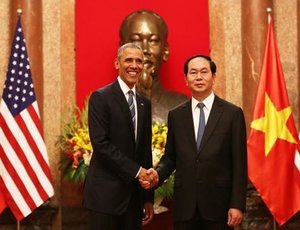Key takeaways from Obama’s Vietnam Visit
 By: Oscar Mussons, Associate International Business Advisory at Dezan Shira & Associates
By: Oscar Mussons, Associate International Business Advisory at Dezan Shira & Associates
Editor: George Llewellyn-Jones
Visiting to bolster economic ties, President Barack Obama’s visit gives prominence to the achievements being made in the Vietnamese economy. In his own words, “We see Vietnam’s progress in the skyscrapers and high-rises of Hanoi and Ho Chi Minh City”. As Vietnam has reformed, so has trade between the two countries, totalling US $45 billion in 2015. The trip is part of Obama’s efforts to promote the U.S.’s pivot to Asia in the form of the TPP, with Vietnam being a linchpin to the Asia rebalance.
Vietnam has developed drastically since the Đổi Mới reforms introduced in the mid-1980s. Its image has changed from one of a war-torn nation to one of modernization and prosperity, boasting a growth rate of 6.68 percent. With accession into the WTO in 2007, Vietnam has committed itself to international standards of trade. Higher quality checks, labour reforms, environment sustainability and intellectual property protection are all part of its integration into the global economy. Since 2015, enterprises in a number of industries can now, for the first time, be 100 percent foreign owned. Corruption however, remains rife and top leaders have openly recognized it as a key obstacle in popularizing Vietnam as an attractive investment destination worldwide. Improving the quality of public services and reducing corruption have both been earmarked on the national agenda in recent years but there is still some way to go.
Unfettered by these challenges, foreign investment is pouring in as investors are picking Vietnam over its East Asian neighbours for the lucrative opportunities available in the country. ‘High quality” FDI inflows are being targeted by the government, with a focus on projects that use advanced and environmentally friendly technologies. Progress has been made with Vietnam’s internal technological innovation. Attracted by a young, well-educated labour force and generous tax incentives, Samsung, Intel, LG and Microsoft have all set up research and manufacturing plants within the past few years.
 RELATED: Dezan Shira & Associates’ Corporate Establishment Services
RELATED: Dezan Shira & Associates’ Corporate Establishment Services
The Vietnam-China Nexus
Vietnam has the capabilities to produce high end products and its emerging middle class is ready to consume them. The middle class is expected to burgeon to 44 million by 2020 and expand to 95 million by 2030, according to estimates by U.S. research company Nielsen. Additionally, exports are being buoyed up by the booming textile and manufacturing industries which are finding their niche in global markets due to the regional advantages Vietnam has in areas such as lower wages and tax incentives. The performance has in large part has come from the downturn in China and rising operational costs that are holding China back from remaining competitive with emerging ASEAN economies such as Vietnam.
China however, is still Vietnam’s largest trading partner and whilst barking from both sides over territorial disputes has heightened tensions, there is an incentive to keep outspoken politicians from both communist parties in check. Vietnam is learning the art of diplomacy fast, with a courting from President Obama’s TPP deal in an attempt to wrestle Vietnam away from the lures of China. At the same time, it is vital for the Vietnamese economy to show good face and ensure bilateral cooperation and trade with its norther neighbor.
 RELATED: Oscar Mussons speaks with CNBC on the implications of Obama’s Trip to Vietnam
RELATED: Oscar Mussons speaks with CNBC on the implications of Obama’s Trip to Vietnam
TPP and the Future of Vietnamese – US Relations
The Trans Pacific Partnership will bring many benefits to Vietnam, not least in its unrestricted access to American markets but also to the rest of the 800 million consumers within the TPP bloc – which accounts for 41 percent of global trade. Vietnam is poised to be a winner during the implementation of the TPP which also furthers its advantageous position over China. The TPP will either abolish or drastically reduce tariffs on the vast majority Vietnamese exports to the twelve TPP members including the Japan and the United States. President Obama’s visit reassures both Vietnam and foreign investors on his intentions to get the TPP ratified before he leaves office.
Vietnam already has nine free trade agreements in place most notably the ASEAN-FTA, the ASEAN-China FTA and the ASEAN-India FTA with seven more in the negotiating stage including the EU-Vietnam FTA and the TPP. The TPP agreement could increase Vietnam’s GDP by 8.1 percent by 2030, making the nation one of the deal’s biggest winners. Vietnam has reinforced the gains of the TPP by reducing it corporate income tax to 20 percent till 2020, which stands at 5 points lower than China’s. Vietnam will have to buckle down and abide by stricter IP protection standards in addition to other administrative trade protocols required by the U.S. to sell to the American market. If successful, this could make Vietnam the preferred destination for U.S. investors. Obama’s visit serves as a kind reminder for Vietnam to meet its commitments in order to reap the benefits from the TPP.
Vietnam is expected to become a vital economic and security partner in the U.S.’s shift to the Asia-Pacific region. Obama commented on the “new generation of Vietnamese who are ready to make their mark on the world”. Demographically speaking, Vietnam is at a major advantage with a young and dynamic populace, full of entrepreneurial spirit. Investors are not holding back for the next generation to come to fruition, Vietnam is ready for investment now with foreign direct investment pledges growing to more than 119 percent year-on-year to over US$ 4 billion in the first quarter, figures from the Foreign Investment Agency showed. 60 percent of its population are of working age, 45 percent of which are under 35 years old. The populace are disciplined, hard-working and, are developing into a more qualified workforce. Geographically, Vietnam is at a strategic advantage, being located in the heart of Asia, it a multitude of access to major shipping lanes along its 3,444-kilometre-long coastline. 90 percent of Vietnamese goods are transported by sea and the government is encouraging private investment to develop its ports and other public infrastructure through a growing number of Public Private Partnership (PPP) project opportunities.
The Importance of Continued Investment
Vietnam will require US $160 billion in infrastructure investments by 2020 to sustain growth. Recognizing this, the government has recently circulated a new decree that will make the tendering process for PPP projects more streamlined and open to foreign bidding. Urbanization rates have put a strain on public services including roads, rail, and subways. Contractual arrangements have been updated for the commercialisation of PPP projects which can now be signed in the form of BTO, BT, BOT, BOO and BTL. Many sectors previously restricted from offering PPP projects can now be accessed including the healthcare, education, sports, culture and science and technology industries among others. The Vietnamese government is aware of the importance of institutional reforms to improve the business climate. As well as the new law on enterprises, the new law on investments liberalizes regulation on business conditions and mergers and acquisitions. Many blue-chip companies are already expanding not only in Hanoi and Ho Chi Minh City but across Vietnam.
40 years on from the fall of Saigon, Vietnam’s commercial heart is a far cry from its war days. Today, Vietnam and the U.S. are partners as affirmed by Obama. Closer ties will be beneficial to both countries and foreign investors alike as Obama’s expressed vote of confidence could be a catalyst for a splurge in foreign investment with results already showing. Boeing have announced the sale of 100 737 jets to VietJet in a US$ 11.3 billion dollar deal while General Electric have also finalized deals to develop renewable wind energy with the government during the trip. With a robustly developing economic environment, Vietnam has a lot to offer and a lot to gain. We will see how the newly elected Politburo plays its card in the coming months.
|
Asia Briefing Ltd. is a subsidiary of Dezan Shira & Associates. Dezan Shira is a specialist foreign direct investment practice, providing corporate establishment, business advisory, tax advisory and compliance, accounting, payroll, due diligence and financial review services to multinationals investing in China, Hong Kong, India, Vietnam, Singapore and the rest of ASEAN. For further information, please email vietnam@dezshira.com or visit www.dezshira.com. Stay up to date with the latest business and investment trends in Asia by subscribing to our complimentary update service featuring news, commentary and regulatory insight. |
![]()

Annual Audit and Compliance in Vietnam 2016
In this issue of Vietnam Briefing, we address pressing changes to audit procedures in 2016, and provide guidance on how to ensure that compliance tasks are completed in an efficient and effective manner. We highlight the continued convergence of VAS with IFRS, discuss the emergence of e-filing, and provide step-by-step instructions on audit and compliance procedures for Foreign Owned Enterprises (FOEs) as well as Representative Offices (ROs).
 Navigating the Vietnam Supply Chain
Navigating the Vietnam Supply Chain
In this edition of Vietnam Briefing, we discuss the advantages of the Vietnamese market over its regional competition and highlight where and how to implement successful investment projects. We examine tariff reduction schedules within the ACFTA and TPP, highlight considerations with regard to rules of origin, and outline the benefits of investing in Vietnam’s growing economic zones. Finally, we provide expert insight into the issues surrounding the creation of 100 percent Foreign Owned Enterprise in Vietnam.
 Tax, Accounting and Audit in Vietnam 2016 (2nd Edition)
Tax, Accounting and Audit in Vietnam 2016 (2nd Edition)
This edition of Tax, Accounting, and Audit in Vietnam, updated for 2016, offers a comprehensive overview of the major taxes foreign investors are likely to encounter when establishing or operating a business in Vietnam, as well as other tax-relevant obligations. This concise, detailed, yet pragmatic guide is ideal for CFOs, compliance officers and heads of accounting who must navigate Vietnam’s complex tax and accounting landscape in order to effectively manage and strategically plan their Vietnam operations.
- Previous Article Pourquoi Investir dans le Secteur Manufacturier au Vietnam?
- Next Article Leveraging Vietnamese Customs to Block Counterfeit Exports









